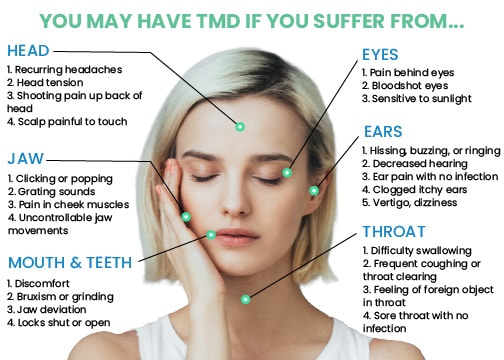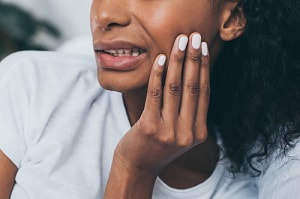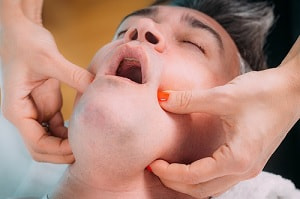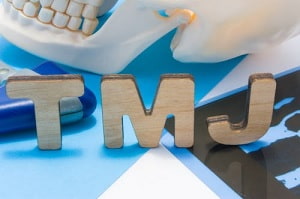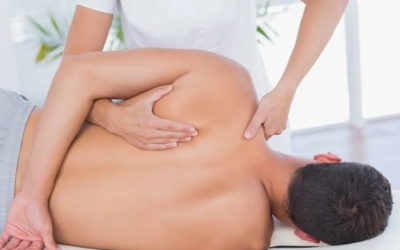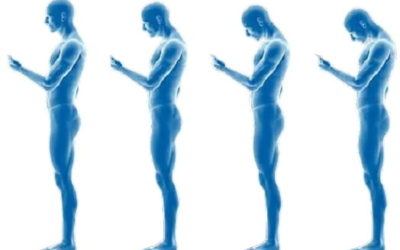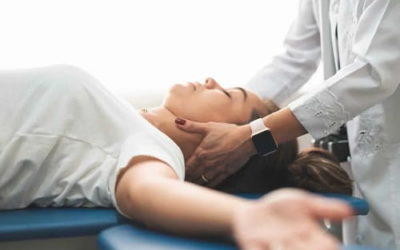SIGNS AND SYMPTOMS OF TMJ / TMD
What are signs and symptoms of TMJ?
Everyone is unique, and while there are common symptoms of temporomandibular disorder (TMD), there are other signs that are related to TMJ / TMD issues that only a handful of people experience. For the sake of thoroughness, we have put together a list of every symptom we know of that relates to TMD.
As you read through this list, you will inevitably find symptoms that you experience and some that may sound a bit outlandish to you (like tingling in your fingers). To find out if your symptoms are related to TMD, you should consult with your dentist, or schedule an appointment with our TMJ Specialist, Jana.
Be sure to read our article, “What is TMJ” to gain a better understanding of how your temporal bones and temporomandibular joint (TMJ) functions. What is TMJ?
TMJ Fact:
Depending on the cause and severity of your TMJ disorder, your symptoms may go away in a few days.Your Jaw:
• You feel jaw pain or a tenderness feeling in your jaw, especially close to your TMJ joints.
• You feel pain in one or both of your temporomandibular joints (TMJs).
• You feel pain in your jaw joint that worsens throughout the day.
• You hear popping and/or clicking sounds in your jaw when you open and close your mouth or chew. (this condition is also known as crepitus).
• The clicking, popping, or grating sounds in your jaw joint causes pain.
• Your jaw locks in the open or close position (commonly referred to as lockjaw).
• Your jaw joint is difficult to open and/or close.
• You feel a dull ache in the muscles around your jaw.
• Your jaw muscles feel tight or stiff. (This is also referred to as myofascial pain.)
• Your jaw’s movement is limited.
• You feel a grating sensation when you are moving your jaw.
• You experience muscle spasms in the muscles that control your jaw.
• Your jaw regularly feels sore in the morning or late afternoon.
• You have arthritis around your TMJ.
• You experience uncontrollable jaw movements.
Your Mouth:
• You have difficulty chewing or experience pain while chewing.
• You experience pain that feels like a toothache.
• You feel pain at the base of your tongue.
• You hear popping or clicking sounds when you open and close your mouth.
• You have cracked, worn, or broken teeth from grinding your teeth.
• You experience problems when you try to open your mouth wide.
• Your teeth are sensitive without an oral health disease.
• Your mouth has a limited range of motion.
• You frequently clench or grind your teeth.
• You notice a change in the way your upper and lower teeth fit together.
Your Ears:
• You feel an aching pain in and around your ear.
• You have difficulty hearing.
• You hear cracking, hissing, buzzing, or popping sounds in your ears.
• You experience earaches or ringing in your ears.
• You feel pain or tenderness in or around the ear when you chew, speak, or open your mouth wide.
• Your ears feel clogged or itchy.
Your Face:
• You feel aching or radiating pain in your face.
• Your cheeks hurt.
• You experience tingling or numbness in your chin.
• You feel pain in your sinuses.
• You feel pain or tenderness in your face when you chew, speak, or open your mouth wide.
• Your facial muscles feel tired.
• You notice swelling on the side of your face.
Your Head:
• You experience frequent headaches, including migraines.
• You regularly experience dizziness or vertigo.
• You feel pain, swelling, or a lump in your temple area.
• You feel shooting pains up the back of your head.
• Your scalp is painful to touch.
Your Eyes:
• Your vision is blurred.
• You feel pain spreading behind your eyes.
• Your eyes are sensitive to sunlight.
• Your eyes are bloodshot red without any obvious reason why.
Your Neck:
• Your neck muscles feel tight, stiff, or sore.
• You experience pain or tenderness in your neck when you speak, chew, or yawn.
• Your neck aches.
• You feel a radiating pain in your neck.
• You feel pain in the upper portion of your shoulders.
Your Throat:
• You have difficulty swallowing.
• You cough or clear your throat frequently.
• You feel like there is something stuck in your throat.
• You have a sore throat without infection.
Others Signs and Symptoms:
• You suffer from condylar degeneration (degenerative joint disease).
• You feel numbness or a tingling feeling in your fingers.
TMD Fact:
Women 18-44 years of age have increased risk of developing TMD.Featured on Virginia This Morning:
Jana Powell recently sat down with Jessica Noll from Virginia This Morning to talk about TMD.
Want to get rid of TMJ symptoms once and for all?
Are you looking for a long-term solution to TMJ issues or jaw pain? A TMJ massage at Attune Massage Therapy can help you alleviate TMJ and TMD symptoms with customized treatment options, education, and more.
In addition to teaching you different TMJ exercises, Jana can also help you get same-day relief from TMJ symptoms!
If you are in the Richmond area, you can schedule your first TMJ session with Jana today!
For more information about Pediatric TMJ Massages, please visit: Pediatric TMJ.
This article should be used for educational purposes only (not advice, diagnosis, or treatment).
Now Offering: Virtual Couples Massage Workshops
Would you like to learn how to give great massages?
Book Your Private Couples Massage Workshop:
In this customized, interactive 90-minute workshop, Jana will demonstrate and teach a few professional massage techniques that will not only help to save hands, but will also provide you & your partner a therapeutic-based massage. Contraindications and Endangerment Sites will be taught. This workshop can be done in person or virtually. The work Jana teaches is done on the floor with pillows, so it can be performed anywhere. All participants will be clothed the entire time (gym attire is appropriate). You will also receive a PDF document that will contain all instructions and reminders so you can focus on being 100% present in the workshop. An intake form will be sent out after purchase of the workshop and must be completed and returned at least 72 hours prior to your workshop so Jana can help you and your partner get the most out of the course.
Additional Resources:
How to Get Rid of Ear Pain From TMJ
How To Get Rid of Ear Pain From TMJWho Knew TMJ Could Be Such a Pain in the EAR?! If you are a woman, you are 9 times more likely to experience TMJ...
How to Relieve TMJ Jaw Pain
HOW TO Relieve TMJ Jaw PainTemporomandibular disorder (TMD) pain does not last long for many people. In some cases, TMJ pain may go away on its own....
How to Treat TMJ
HOW TO TREAT TMJ AND TMD Let’s start with the easiest treatment options. There are numerous TMJ and TMD treatment options available for TMJ...
WHAT ARE THE CAUSES OF SUDDEN TMJ PAIN
WHAT ARE THE CAUSES OF SUDDEN TMJ PAIN? You are sitting on your sofa watching Netflix and suddenly your jaw (temporomandibular joint) starts...
WHAT IS TMJ? EVERYTHING YOU NEED TO KNOW ABOUT TMJ
WHAT IS TMJ?TMJ is short for Temporomandibular joint (tem-puh-roe-man-dib-u-lur). Your TMJ is a jaw joint that connects your lower jaw to your...
VISIT THE LEADER IN RICHMOND MASSAGE THERAPY TO GET RELIEF
Resource: VISIT THE LEADER IN RICHMOND MASSAGE THERAPY TO GET RELIEF.We Go Beyond Traditional Relaxing Massage Techniques. At Attune Massage...
–
Resource: AVOID TEXT NECK AKA FORWARD HEAD POSTURE WITH THESE TIPS.What is Text Neck? Walk into any room, and you’re bound to find at least one...
HOW POSTURE CORRECTION EXERCISES IMPROVE TMJ SYMPTOMS
Resource: HOW POSTURE CORRECTION EXERCISES IMPROVE TMJ SYMPTOMS.Look at how you are sitting right now. Would you say that you are exhibiting...
Subscribe and get $10 OFF your next massage!
Enter your name and email address to get updates, information, and other exclusive deals ONLY offered to subscribers!
